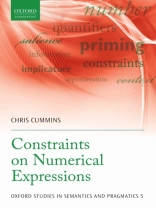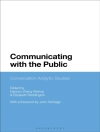This book considers how expressions involving number are used by speakers and understood by hearers. A speaker’s choice of expression can be a complex problem even in relatively simple-looking domains. In the case of numerical expressions, there are often many choices that would be semantically acceptable: for instance, if ‘more than 200’ is true, then so is ‘more than 199’, ‘more than 150’, and ‘more than 100’, among others. A speaker does not choose between theseoptions arbitrarily but also does not consistently follow any simple rule. The hearer is interested not just in what has been said but also in any further inferences that can be drawn. Chris Cummins offers a set of criteria that individually influence the speaker’s choice of expression. The process of choosing what to say is then treated as a problem of multiple constraint satisfaction. This approach enables multiple different considerations, drawn from principles of semantics, philosophy, psycholinguistics and the psychology of number, simultaneously to be integrated within a single coherent account. This constraint-based model offers novel predictions about usage andinterpretation that are borne out experimentally and in corpus research. It also explains problematic data in numerical quantification that have previously been handled by more stipulative means, and offers a potential line of attack for addressing the problem of the speaker’s choice in more generallinguistic environments.
Chris Cummins
Constraints on Numerical Expressions [PDF ebook]
Constraints on Numerical Expressions [PDF ebook]
Mua cuốn sách điện tử này và nhận thêm 1 cuốn MIỄN PHÍ!
Ngôn ngữ Anh ● định dạng PDF ● Trang 256 ● ISBN 9780191511738 ● Nhà xuất bản OUP Oxford ● Được phát hành 2015 ● Có thể tải xuống 3 lần ● Tiền tệ EUR ● TÔI 4027137 ● Sao chép bảo vệ Adobe DRM
Yêu cầu trình đọc ebook có khả năng DRM












